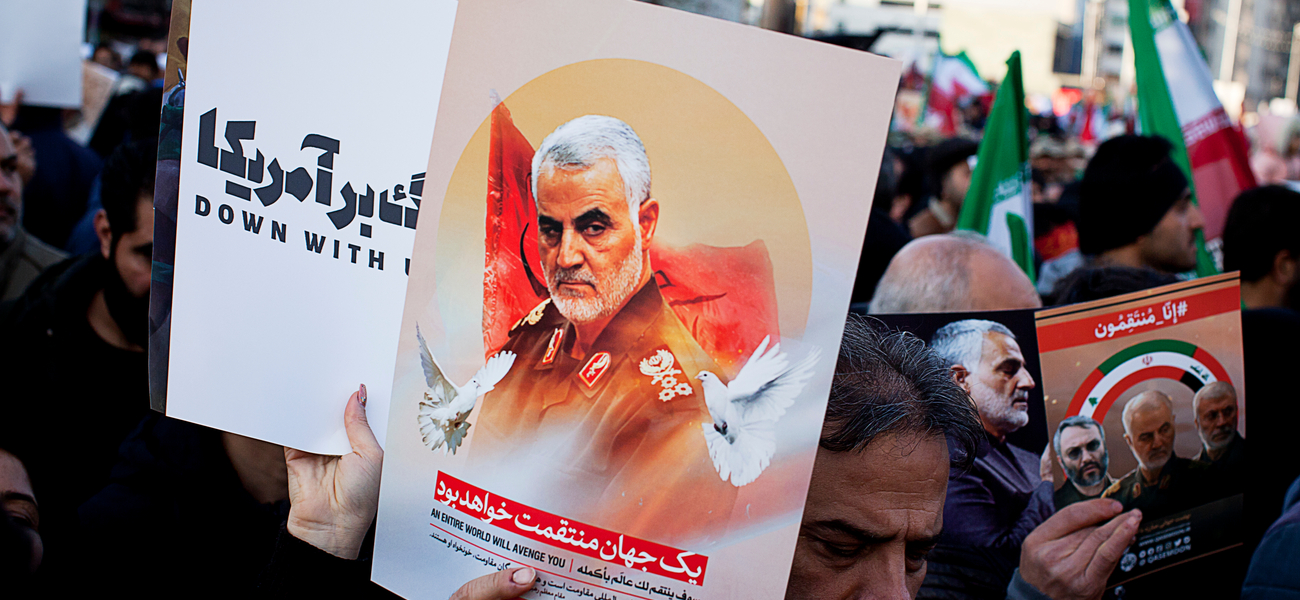January 3rd market the second anniversary of the assassination of Commander Qasem Soleimani, who served in the Islamic Revolutionary Guard Corps. Iran used this anniversary to send messages to countries within the region, as well as to international Powers. These messages are linked to a set of key objectives that Iran is trying to achieve, the most notable of which are: to exert stronger pressure on US presence in Iraq; to insist that Iran’s policy towards Washington will not change; to send further warnings to Israel in the context of escalating confrontation; and to reaffirm Iranian autonomy irrespective of Russian pressures.
In commemoration of the second anniversary of the death of Qasem Soleimani, alongside Deputy Chief of the Iraqi Popular Mobilization Committee Abu Mahdi Al Mohandes, in a US airstrike on January 3, 2020, Iran has broadcast direct messages that stand in alignment with its stance in the Vienna talks with the P4+1 and indirect US participation. Iran’s discourse also addressed the continued escalation between Iran and Israel as the latter seeks to neutralize Iran’s nuclear program it deems as a threat. In his meeting with the Soleimani family, the Supreme Leader of the Republic and former Commander of the Jerusalem Legion, Ali Khameni declared that Qasem Soleimani remains the most patriotic and distinguished figure in Iran and the Islamic world,” noting that “Martyr Soleimani is more dangerous than General Soleimani.”
In parallel to these declarations, Iraqi bases hosting US and International Coalition Forces, Victoria and Ain Assad, have been attacked by drones; Lebanese Hizballah Secretary General Hassan Nasrallah attacked US policy in the region, holding the US responsible for developments in Iraq and Syria; and the Secretary General of the Al-Haq militia of Iraq, Qays Al-Khazali, issued warnings to Washington of the consequences of its continued military presence in Iraq during the next phase.
Commemorations of Soleimani’s death served as a platform for Iran and its regional allies from which to broadcast messages that reflect Iran’s multiple objectives, most notably:
Separating the nuclear and regional files: Iran is underlining its own interpretation of the Vienna talks, whose eighth round was resumed on January 3 this year, which is that the talks revolve exclusively on concluding a nuclear agreement between the participating countries, and do not extend to other contentious issues, particularly Iran’s regional role and missile program. Iran has emphasized this by launching, last December, 16 ballistic missiles in the context of the Great Messenger 17 Maneuvers. Khamenei’s speech while receiving the Soleimani family clearly reflects Iran’s stance. According to Khamenei, instead of deterring Iran’s role in the region, the assassination may have exacerbated Iran’s defiance as Khemeni seeks to retaliate Trump’s decision to assassinate Soleimani.
Putting pressure on the US in Iraq: On December 10th ,2021, US Central Command General Frank McKenzie remarked that following the end of the international coalition’s combat operations against ISIS, 2,500 US troops remain in Iraq. This displeased Tehran, which perceived this as a challenge to its influence in Iraq. Iran has given the green light to its allied militias to launch drone attacks against US bases and international coalition forces, or to directly threaten the US forces in Iraq, as reflected in statements made by Qais al-Khazali. The Iraqi Government appears to have attempted to prevent further tensions on the second anniversary of the assassination, which was one of the goals of Iraqi Foreign Minister Fouad Hussein’s visit to Tehran on 23 December.
Confirming Iranian policy toward US remains unchanged: Whereas reaching the July 2015 nuclear agreement was accompanied by a telephone call between presidents Barack Obama and Hassan Rouhani and involved several direct meetings between Foreign Ministers John Kerry and Mohammad Jawad Latif, Tehran remains adamant that reaching a deal in Vienna will not improve relations between the US and Iran in the near future. Iran’s Foreign Ministry spokesman Saeed Khatibzadeh’s emphasized this in remarks on December 31st , declaring “The administration of US President Joe Biden also bears responsibility for the previous administration’s decision to kill Soleimani.” This does not mean that in the event a deal is reached Iran will be reluctant to engage in economic transactions with the US or the West in general. Rather, Iran is signaling there will be a clear ceiling on such engagements, so that it may not suffer significant damages, as it did when the former Trump administration withdrew from the nuclear agreement in 2018, imposing sanctions on Iran in August of the same year.
New threats to Israel: Iran is clearly concerned regarding Israeli threats to launch military strikes or security operations against its nuclear facilities. Iran can’t rule out the possibility that Tel Aviv will engage in new operations to disrupt its nuclear activities even if a deal is concluded in the Vienna negotiations. Accordingly, Iran has given warnings that the cost of launching military action against its nuclear installations will be high as it can mobilize its agents across the region, in Syria, Lebanon, Iraq or Yemen.
Containing Russia’s rising influence: It was notable that the Iranian discourse commemorating Soleimani focused on his alleged role in the fight against ISIS in Syria and Iraq, and the significant impact of his efforts on tipping the balance of power in favour of the Syrian regime in recent years. The main objective of this rhetoric was to downplay Russia’s attempts to promote itself as the primary force in steering the crisis in Syria. Undoubtedly, this reveals the contention between the two countries’ vis-a-vis developments in Syria. This does not mean, however, that Iran will abandon its strong relations with Russia, as it is in fact moving to consolidate them, with President Raisi’s plans to visit Moscow soon. Rather, Iran seeks to make clear that such relations do not undermine its ability to take independent stances, which suggests it is responding to reports that Moscow pressured Iran, forcing it to change its position in the Vienna negotiations.
It is noteworthy that the US also sought to capitalize on the second anniversary of the Soleimani assassination to send its own warnings to Tehran, indicating it will not hesitate to defend its interests even if that means once more undertaking operations of this type. Although as a presidential candidate Biden criticized the decision to assassinate Soleimani, stating that Trump had “tossed a stick of dynamite into a tinderbox,” the Biden administration is currently sending clear messages that US interests in the Middle East will not be compromised despite its military withdrawal from the region. This suggests that a nuclear deal in Vienna may not help contain tension and escalation in the Middle East in the near future.


